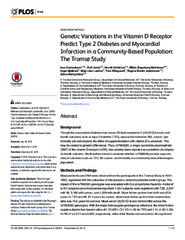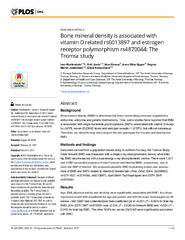| dc.contributor.advisor | Elena, Kamycheva | |
| dc.contributor.author | Martinaityte, Ieva | |
| dc.date.accessioned | 2018-04-12T08:34:49Z | |
| dc.date.available | 2018-04-12T08:34:49Z | |
| dc.date.issued | 2018-03-22 | |
| dc.description.abstract | Cholecalciferol (vitamin D) is a biologically active substance, which acts in both skeletal and non-skeletal metabolic pathways, and is stored most in adipose tissue. Its active metabolite 1,25-dihydroxyvitamin D (1,25(OH)2D), bound to the vitamin D receptor (VDR), regulates gene expression and initiates rapid responses in the cells that regulate bone and adipose tissue homeostasis, lead to anti-diabetic, anti-atherosclerotic, and anti-carcinogenic effects. Furthermore, low vitamin D levels are associated with diverse negative health outcomes. Nevertheless, the clinical relevance of storage of vitamin D and its metabolites in adipose tissue as well as clinical effect of vitamin D supplementation has not yet been established.
In our project, we found that vitamin D supplementation for 3–5 years maintains sufficient serum 25-hydroxyvitamin D (25(OH)D) levels in 1 year after cessation, likely due to the storage of vitamin D in subcutaneous adipose tissue (which decreased by half during the follow-up). 25(OH)D in adipose tissue was measured in smaller amounts, and probably is important for local vitamin D actions. In addition, we identified the gene variation rs7968585, related to VDR, to be associated with type 2 diabete,s and possibly with myocardial infarction. Finally, we found that the single nucleotide polymorphism (SNP) rs6013897 in the gene involved in the degradation of 25(OH)D and synthesis of 1,25(OH)2D was associated with total hip bone mineral density (BMD), and that the estrogen receptor related SNP rs4870044 was a risk factor for both forearm and total hip BMD in a population from Tromsø, Northern Norway. We also evaluated predictors for BMD, and, surprisingly, serum 25(OH)D levels were not among them, possibly due to generally sufficient vitamin D levels in our study population. | en_US |
| dc.description.doctoraltype | ph.d. | en_US |
| dc.description.popularabstract | Vitamin D is a hormone, found in most of tissues and organs. Vitamin D modifies about 3% of human genes, and also acts directly in cells. In addition to the essential role of maintaining bone health, vitamin D is also believed to be important in boosting the immune system, regulating processes in fat tissue, and preventing the certain negative health outcomes.
In our project, we found that vitamin D supplementation for 3–5 years maintained sufficient serum vitamin D levels the following year after cessation, likely due to storage of vitamin D in fat tissue. In addition, we investigated if there were any gene variations related to vitamin D and estrogen, which could increase the risk of negative health outcomes, including cancer and death. We found that certain vitamin D and estrogen related genes could increase the risk of type 2 diabetes, myocardial infarction (rs7968585) and low bone mineral mass (rs4870044 and rs6013897) in our population from Tromsø, Northern Norway. | en_US |
| dc.description.sponsorship | HelseNord | en_US |
| dc.description | Paper I of this thesis is not available in Munin. <br>
Paper I: Martinaityte, I., Kamycheva, E., Didriksen, A., Jakobsen, J., Jorde, R., (2017). Vitamin D Stored in Fat Tissue During a 5-Year Intervention Affects Serum 25-Hydroxyvitamin D Levels the Following Year. Available in <a href=https://doi.org/10.1210/jc.2017-01187> The Journal of Clinical Endocrinology & Metabolism, 102(10): 3731–3738. </a> | en_US |
| dc.identifier.uri | https://hdl.handle.net/10037/12516 | |
| dc.language.iso | eng | en_US |
| dc.publisher | UiT The Arctic University of Norway | en_US |
| dc.publisher | UiT Norges arktiske universitet | en_US |
| dc.rights.accessRights | openAccess | en_US |
| dc.rights.holder | Copyright 2018 The Author(s) | |
| dc.rights.uri | https://creativecommons.org/licenses/by-nc-sa/3.0 | en_US |
| dc.rights | Attribution-NonCommercial-ShareAlike 3.0 Unported (CC BY-NC-SA 3.0) | en_US |
| dc.subject | VDP::Medisinske Fag: 700::Klinisk medisinske fag: 750 | en_US |
| dc.subject | VDP::Medical disciplines: 700::Clinical medical disciplines: 750 | en_US |
| dc.subject | The Tromsø Study | |
| dc.subject | Tromsøundersøkelsen | |
| dc.title | Storage of vitamin D in adipose tissue and associations between vitamin D related genetic variants and diabetes, myocardial infarction, cancer, death, and low bone mineral density. Results from a high-dose vitamin D study and the Tromsø Study | en_US |
| dc.type | Doctoral thesis | en_US |
| dc.type | Doktorgradsavhandling | en_US |


 English
English norsk
norsk


